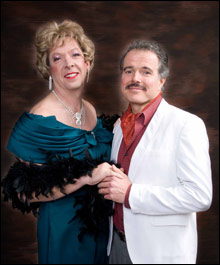
IDENTITY CRISIS: Being who they want to be. |
If you think you've got problems with your in-laws, try on Jean-Michel's woes: His future father-in-law is an intolerant, ultra-right-wing tool of a politician, who is eager to pass judgment on Jean-Michel's parents. Jean-Michel's father, on the other hand, is the owner and MC of a famously decadent drag club. And his mom? "She" is the club's bejeweled leading "lady."As the dreaded meeting approaches, there ensues much comedy — in both the ha-ha and the literary senses — in the musical La Cage aux Folles, in a production by Portland Players that is, despite some weakness in the way of voices, a winningly acted, colorful, and very spirited show.
Georges (Jaimie Schwartz) runs the popular La Cage aux Folles in lush, stylish Saint Tropez, and his domestic partner, Albin (Jonathan Carr), is also his biggest star — a droll drag queen chanteuse with the stage name "Zsa Zsa." Georges also has a grown son, Jean-Michel (Matt Withee), a result of one drunken evening of experiment with a chorus girl. The woman is now long gone, and Jean-Michel has been raised by Georges and Albin. So it's a big deal when he announces his engagement to the daughter of a right-wing social conservative named Dindon (Alex Pratt), who is aiming to purge the Riviera of just Georges's and Albin's sort of debauchery. And it's an even bigger deal when Jean-Michel requests that Albin — his own mom — make himself scarce when the Dindons come to dinner.

The world Jean-Michel wants to hide from his future in-laws is a vibrant tizzy of feathers and glitter, high kicks and double entendres. It's quite a party, and Portland Players' costume designer Paul J. Bell has a lot of fun with the plumage. The chorus "girls," known as "Les Cagelles," frolic in hot pinks, purples, and greens; there are plenty of bird allusions, and luscious white frothy underthings. Voice quality among the Cagelles is a little uneven, and their choreography is on the simple side, but they've got brio and glee in spades. One standout among them is "Hanna from Hamburg" (Steven Riley), a dominatrix in form-fitting black leather with a whip (which I would love to see him actually crack during his surprisingly sexy, red-lit solo) who is dating the progressively-injured stage manager Francis (Michael Best). Another sharp character, both sartorially and in presence alone, is Thomas Jerome Smallwood's sassy butler/maid Jacob, who struts around in, alternately, a black sparkly leotard, a mod sheath mini-dress, and ye-oldy butler garb, complete with powdered wig.
As the king and queen of this sumptuous and neurotic playland, Schwartz and Carr have both affection and irony in their rapport. Neither has a pitch-perfect singing voice, but their character work is entertaining and endearing. In their modern-art-bedecked apartment adjoining the club (nicely designed by Steve Lupien), Georges and Albin bicker and cajole with convincingly marital tones. Schwartz looks great and fully the part in his swinging white suit and pimp 'stache, though at times his MC-ing in the club is a little short on volume and bravado. As his leading lady, Carr fleshes out his characterization with nuance and wit both "onstage" and off; Albin's plaints and pokes are rife with wry rolled eyes and delicious deadpans. "I was raised Christian — humility is my lot," he intones to Georges and Jean-Michel, then limply crosses himself and gives just the slightest sardonic shrug. Perhaps the best scene between the two men comes as Georges tries to train Albin in the mannerisms of men, when Carr demonstrates delectable physical comedy in Albin's resigned attempts to slouch, spread his legs, and pick up a croissant sans raised pinky. And when he first emerges in his new man's suit, his cowed and shrunken posture speaks volumes.
Without ever overplaying the emotional dimensions of his role, Carr brings great poignancy to the ideals at the heart of this play — empathy, tolerance, and unconditional love. When Albin banishes the Cagelles from the club's stage to make an impromptu solo of "I Am What I Am," the ache and the pride of his song is remarkably affecting. "This is all about love, this wedding," Albin says to Georges. As their world and a very different one butt up against another, nearly everyone learns a little more about what that means.
Megan Grumbling can be reached atmgrumbling@hotmail.com.